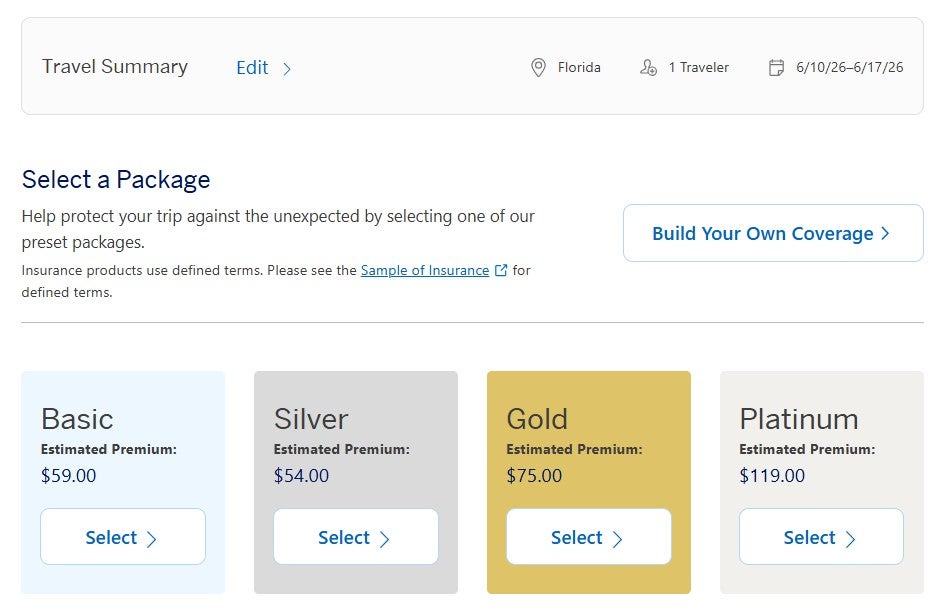Travel insurance can be polarizing, but this guide isn’t about whether it’s worth it — it’s about comparing the top providers to help you find the best option for your next trip.
In this guide, we’ll review policies from seven top travel insurance providers so you can better understand your options before choosing a specific policy and provider.
The best travel insurance providers
Here’s an overview of the travel insurance providers I’ll discuss in this guide:
- Allianz Travel Insurance: Best for frequent travelers who want an annual plan
- American Express Travel Insurance: Best for build-your-own-plan flexibility
- GeoBlue: Best for international medical coverage
- IMG: Best for budget-conscious travelers and international health insurance
- Travel Guard: Best for customizable add-ons and optional bundles
- Travelex Insurance: Best for travelers who may need to cancel for business reasons
- World Nomads: Best for active travelers who enjoy adventure activities
I considered several details while putting together this list of the best travel insurance providers, including favorable ratings from travelers who have used these providers, the availability of details about policies and the claims process online, and the ability to purchase policies in most U.S. states.
Related: Should you get travel insurance if you have credit card protection?
Allianz Travel Insurance
Many travelers regard Allianz highly, including those who have needed to file claims with the provider. Allianz offers single-trip and annual plans that cover multiple trips of 45 (or 90 in the case of AllTrips Premier) days or less.

Some Allianz plans don’t include trip cancellation and interruption insurance, which can be ideal if you usually book award flights and hotels that you can freely cancel until shortly before your trip or feel you’re already getting these protections through your travel rewards cards.
Why consider Allianz Travel Insurance?
- Some single-trip plans allow you to purchase an upgrade that lets you cancel your trip for any reason and get 80% of your nonrefundable trip costs back.
- The AllTrips Premier plan provides annual coverage on trips of up to 90 days for all your household members at a fixed rate, even when household members are traveling separately.
- For emergency transportation coverage, you or someone on your behalf must contact Allianz, and Allianz must then make all transportation arrangements in advance. However, most Allianz policies provide an option if you cannot contact the company: Allianz will pay up to what it would have paid if it had made the arrangements.
Purchase your policy here: Allianz Travel Insurance
American Express Travel Insurance
American Express Travel Insurance offers four package plans and a build-your-own-coverage option. You don’t need to be an American Express cardholder to purchase this insurance.

Amex’s build-your-own-coverage plan is unique because you can purchase just the needed coverage. For most types of protection, you can even select the coverage amount that works best for you.
Why consider American Express Travel Insurance?
- Amex’s build-your-own-coverage option allows you to only pay for the coverage you need.
- Coverage on long trips doesn’t cost more than coverage for short trips if the cost is equal. However, the emergency medical and dental benefit only covers your first 60 days of travel.
- American Express Travel Insurance can protect travel expenses you purchase with Amex Membership Rewards points in the Pay with Points program (as well as travel expenses bought with cash, debit or credit). However, travel expenses bought with other points and miles aren’t covered.
Purchase your policy here: American Express Travel Insurance
GeoBlue
GeoBlue differs from most other providers in this piece because it only provides medical coverage. There are many different policies, but some require primary health insurance in the U.S. (although it doesn’t need to be provided by Blue Cross Blue Shield), and most don’t offer medical coverage within the U.S.
Three general plans fit the needs of most travelers, with options for single-trip coverage, multitrip coverage and long-term stints outside the U.S. However, special plans also provide options for specialty travel, studying abroad and working abroad.

Why consider GeoBlue?
- GeoBlue can be an excellent option if you’re mainly concerned about the medical side of travel insurance.
- GeoBlue provides single-trip, multitrip and long-term medical travel insurance policies for many different types of travel.
- Most GeoBlue policies explicitly cover sudden recurrences of preexisting conditions for medical services and evacuation.
Purchase your policy here: GeoBlue
IMG
IMG offers comprehensive travel insurance, travel medical insurance and international health insurance policies. You can customize many policies, including setting policy maximums on health insurance, covered trip lengths on multitrip medical insurance and more. This customization may let you create a customized plan that gives you what you need at a low rate.
Why consider IMG?
- IMG may be a good option if you need medical or health insurance for a trip.
- The iTravelInsured Lite is a popular budget-friendly travel insurance policy due to its comprehensive coverage (albeit with relatively low coverage maximums) at a modest rate.
- Some IMG travel insurance plans let you add optional cancel-for-any-reason or interruption-for-any-reason coverage.
Purchase your policy here: IMG
Travel Guard
Travel Guard offers three standard plans online, which you can compare side by side. But what sets Travel Guard apart from many other providers in this article is the ability to add a wide variety of optional coverage and bundles to these plans.
You can also buy an annual travel insurance plan through Travel Guard that covers multiple trips of up to 90 days. And if you book a last-minute trip, Travel Guard’s single-trip policy without trip cancellation protection might be worth considering.

Why consider Travel Guard?
- On most single-trip plans, you can include one related child (age 17 and younger) with each paying adult at no additional cost.
- Some single-trip plans allow you to purchase an upgrade that lets you cancel your trip for any reason. However, reimbursement under this coverage will not exceed 50% of your covered trip cost.
- You can add optional bundles to single-trip plans, including adventure sports, baggage, travel inconvenience, quarantine, pets, security and wedding travel.
Purchase your policy here: Travel Guard
Travelex Insurance
Travelex offers four single-trip plans, each with some optional upgrades. One plan doesn’t include trip cancellation protection, making it ideal for refundable and last-minute trips. The other three plans differ primarily in their coverage maximums and inclusions.
Why consider Travelex Insurance?
- Travelex’s Ultimate policy can cover trips lasting up to 180 days and includes one traveling companion 17 years or younger with each insured adult.
- You can add rental property security deposit coverage to most plans, covering up to $2,000 of repairs if you accidentally damage your accommodations.
- You can add cancel-for-any-reason insurance or cancel-for-business-reasons insurance to the Ultimate plan. Cancel-for-any-reason coverage will not exceed 75% of your insured trip cost (up to $7,500), while cancel-for-business-reasons coverage will cover 100% of your insured trip cost (up to $10,000).
Purchase your policy here: Travelex Insurance
World Nomads
World Nomads is more expensive than many other providers discussed in this article. However, it remains popular with active travelers because it covers many adventure activities.
It offers three single-trip plans, each covering one trip of up to 180 days, and one annual plan, covering multiple trips within 12 months of up to 45 days each.

Why consider World Nomads?
- World Nomads’ policies cover more adventure sports than most providers, so all policies include activities such as bungee jumping, and some policies include activities like caving and free soloing.
- You don’t need to estimate prepaid costs when purchasing the insurance.
- Every World Nomads plan also includes help from Blue Ribbon Bags if an airline loses your checked bag, a predeparture medical consultation from Runway Health and a portable personal health record provided by FootprintID.
Purchase your policy here: World Nomads
Other options for buying travel insurance
This guide details the policies of seven providers with the information available at the time of publication. There are many options when it comes to travel insurance, though. To compare different policies quickly, you can use a travel insurance aggregator like InsureMyTrip or SquareMouth to search. Just note that these search engines won’t show every policy and every provider, and you should still research the provided policies to ensure the coverage fits your trip and needs.
You can also purchase a plan through various membership associations, such as USAA, AAA and Costco. Typically, these organizations partner with a specific provider, so if you are a member of any of these associations, you may want to compare the policies offered through the organization with other policies to get the best coverage for your trip.
Related: Valuable travel perks that you can get with a credit card
Is travel insurance worth it?
Whether you should purchase travel insurance is a personal decision. Suppose you use a credit card that provides travel insurance for most of your expenses and have medical insurance that provides adequate coverage abroad. In that case, you may be covered enough on most trips to forgo purchasing travel insurance.

However, suppose your medical insurance won’t cover you at your destination and you can’t comfortably cover a sizable medical evacuation bill or last-minute flight home. In that case, it may be worth purchasing travel insurance. Buying an annual multitrip policy may be worth it if you travel frequently.
Related: 7 times your credit card’s travel insurance might not cover you
What does travel insurance cover?
Travel insurance usually offers some of the following types of coverage:
- Baggage delay protection may reimburse you for essential items and clothing when a common carrier (such as an airline) fails to deliver your checked bag within a set time of your arrival at a destination. You may be reimbursed up to a particular amount per incident or day.
- Lost or damaged baggage protection may provide reimbursement to replace lost or damaged luggage and items inside that luggage. However, valuables and electronics usually have a relatively low maximum benefit.
- Trip delay reimbursement may provide reimbursement for necessary items, food, lodging and sometimes transportation when you’re delayed for a substantial time while traveling on a common carrier such as an airline. This insurance may be beneficial if weather issues (or other covered reasons for which the airline usually won’t provide compensation) delay you.
- Trip cancellation and interruption protection may reimburse you if you need to cancel or interrupt your trip for a covered reason, such as a family death or jury duty.
- Medical evacuation insurance can arrange and pay for medical evacuation if necessary, with the assistance of the insurance provider and a medical professional. This coverage can be particularly valuable if traveling to a region with subpar medical facilities.
- Travel accident insurance may provide a payment to you or your beneficiary in the case of your death or dismemberment.
- Emergency medical insurance may provide payment or reimbursement to you if you must seek medical care while traveling. Some plans only cover emergency medical care, but some also cover other types of medical care. You may need to pay a deductible or copay.
- Rental car coverage may provide a collision damage waiver when renting a car. This waiver may reimburse for collision damage or theft up to a set amount. Some policies also cover loss-of-use charges assessed by the rental company and towing charges to take the vehicle to the nearest qualified repair facility. You generally need to decline the rental company’s collision damage waiver or similar provision to be covered.
Related: Comparing travel protections with the Chase Sapphire Reserve and Amex Platinum
How much is travel insurance?
Travel insurance costs depend on various factors, including the provider, the type of coverage, your trip cost, your destination, your age, your residency and how many travelers you want to insure. A standard travel insurance plan will generally set you back somewhere between 4% and 10% of your total trip cost. However, this can be lower for more basic protections or become even higher if you include add-ons like cancel-for-any-reason protection.

The best way to determine how much travel insurance will cost is to price out your trip with a few providers discussed in the guide. You can also visit an insurance aggregator like InsureMyTrip or SquareMouth to quickly compare options across multiple providers.
Related: My 4 top travel credit cards — and how they elevate my trips
When and how to get travel insurance
For the most robust selection of available travel insurance benefits — including time-sensitive add-ons like cancel-for-any-reason protection and waivers of preexisting conditions for eligible travelers — you should ideally purchase travel insurance on the same day you make your first payment toward your trip.
Some providers may still offer a preexisting conditions waiver if you buy travel insurance within 14 to 21 days of your first trip expense or deposit. But if you don’t need a preexisting conditions waiver and aren’t interested in cancel-for-any-reason coverage, you can purchase travel insurance once your departure date nears.
However, you’ll usually need to purchase your plan before departure, and you must always buy travel insurance before you know you need it. Once you recognize the need, it’s too late to protect your trip.
Once you’ve shopped around and decided upon the best travel insurance plan for your trip, you can almost always complete your purchase online. You’ll usually be able to download your insurance card and the complete policy shortly after the transaction.
Related: The best no-foreign-transaction-fee credit cards
Bottom line
Not all travel insurance policies and providers are equal. Before buying a plan, read and understand the policy documents. This will help you choose a plan appropriate for you and your trip.
For example, if you plan to go skiing or rock climbing, make sure the policy you buy doesn’t exclude these activities. Likewise, if you’re making two back-to-back trips during which you’ll be returning home for a short time in between, be sure the plan doesn’t terminate coverage at the end of your first trip.
Finally, if you’re looking to cover a sudden recurrence of a preexisting condition, select a policy with a preexisting condition waiver and fulfill the requirements for the waiver. After all, buying insurance won’t help if your policy doesn’t cover your losses.











